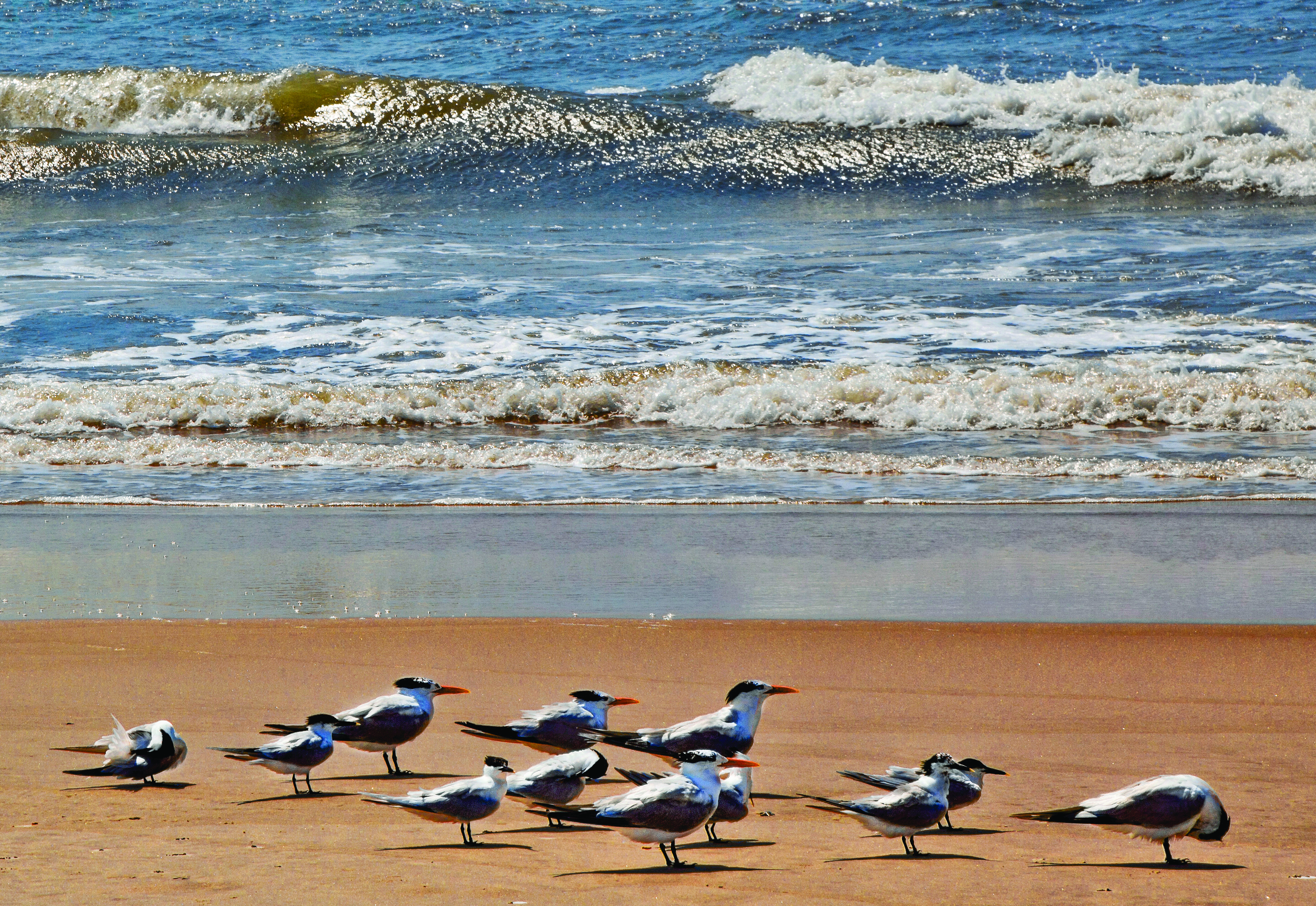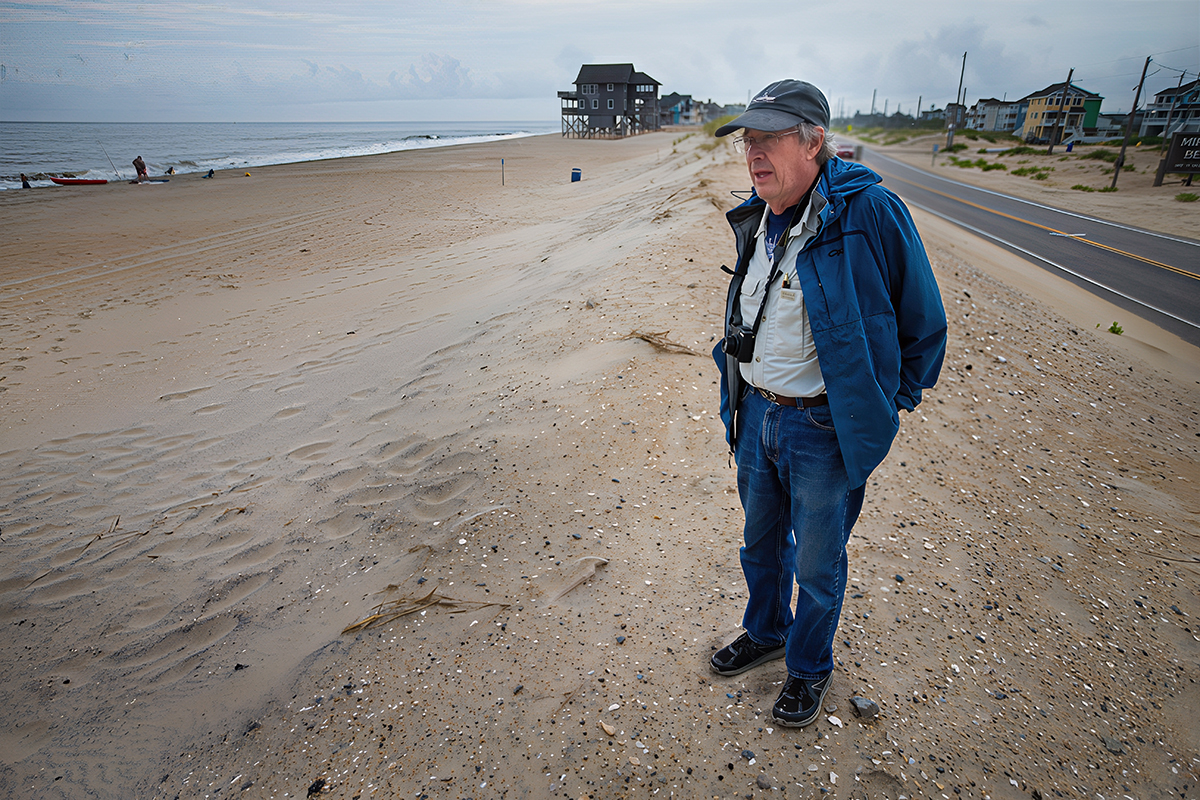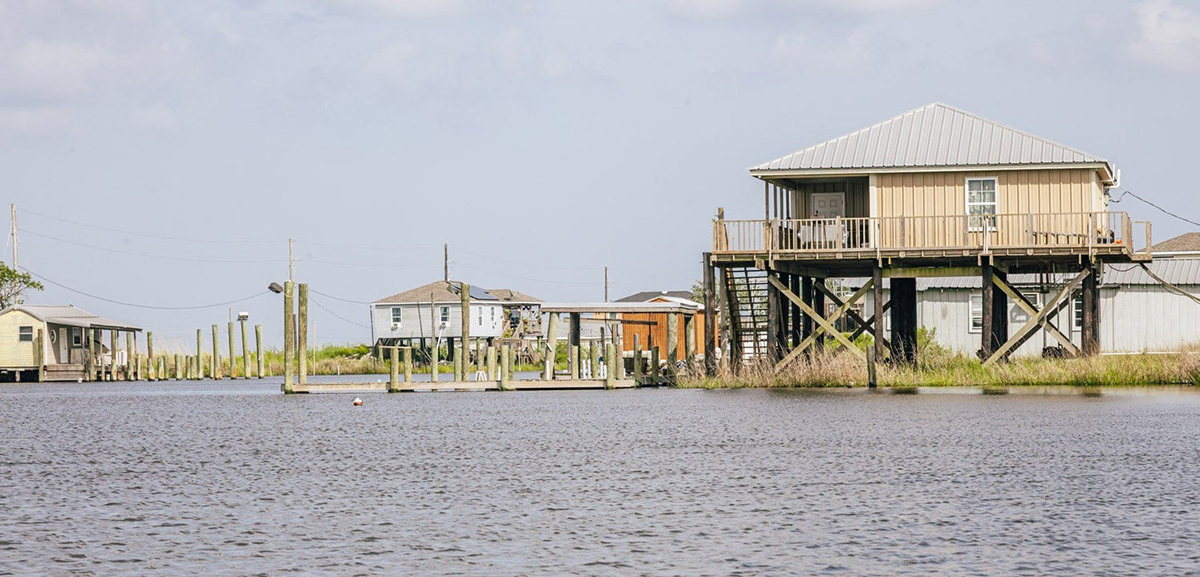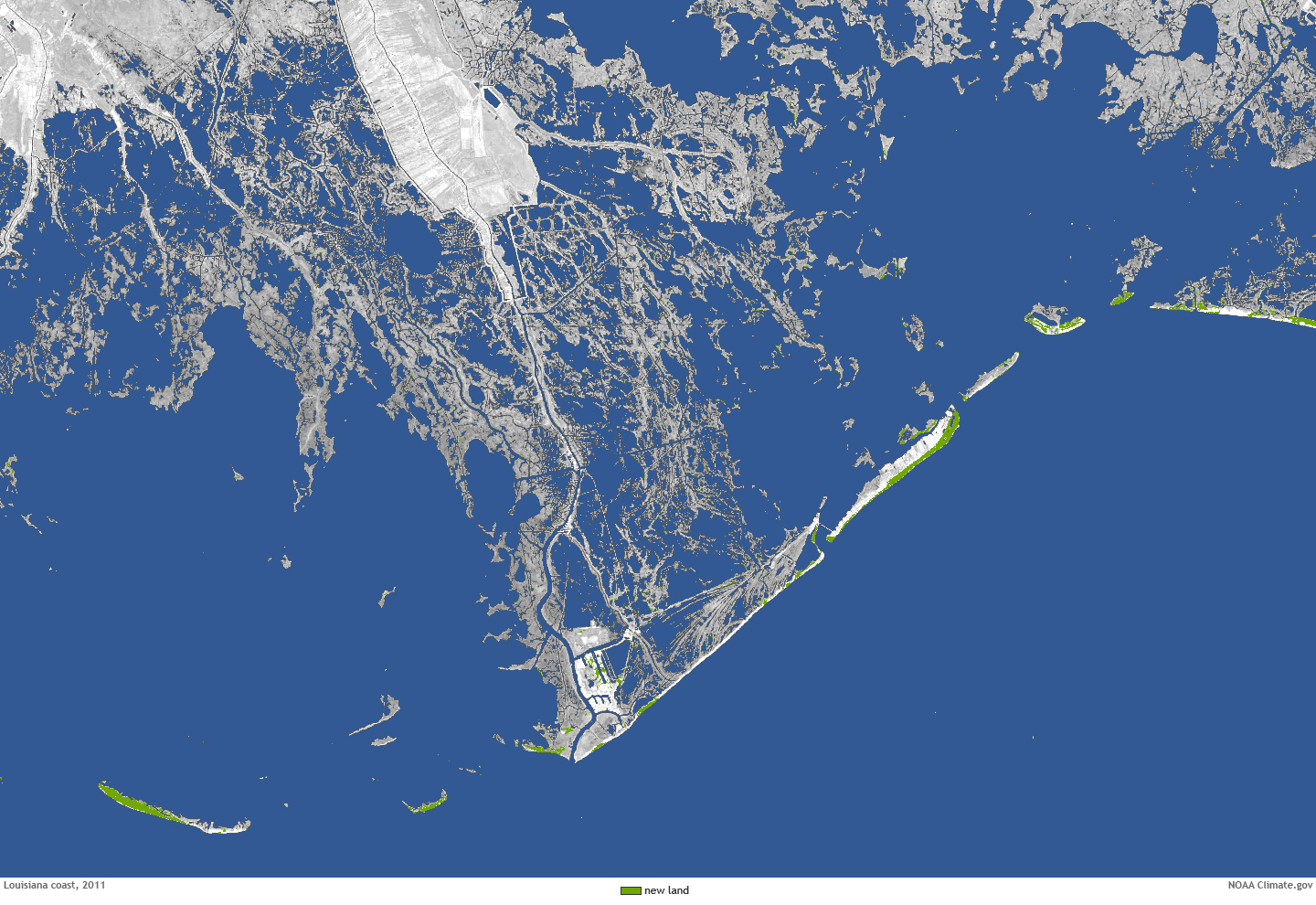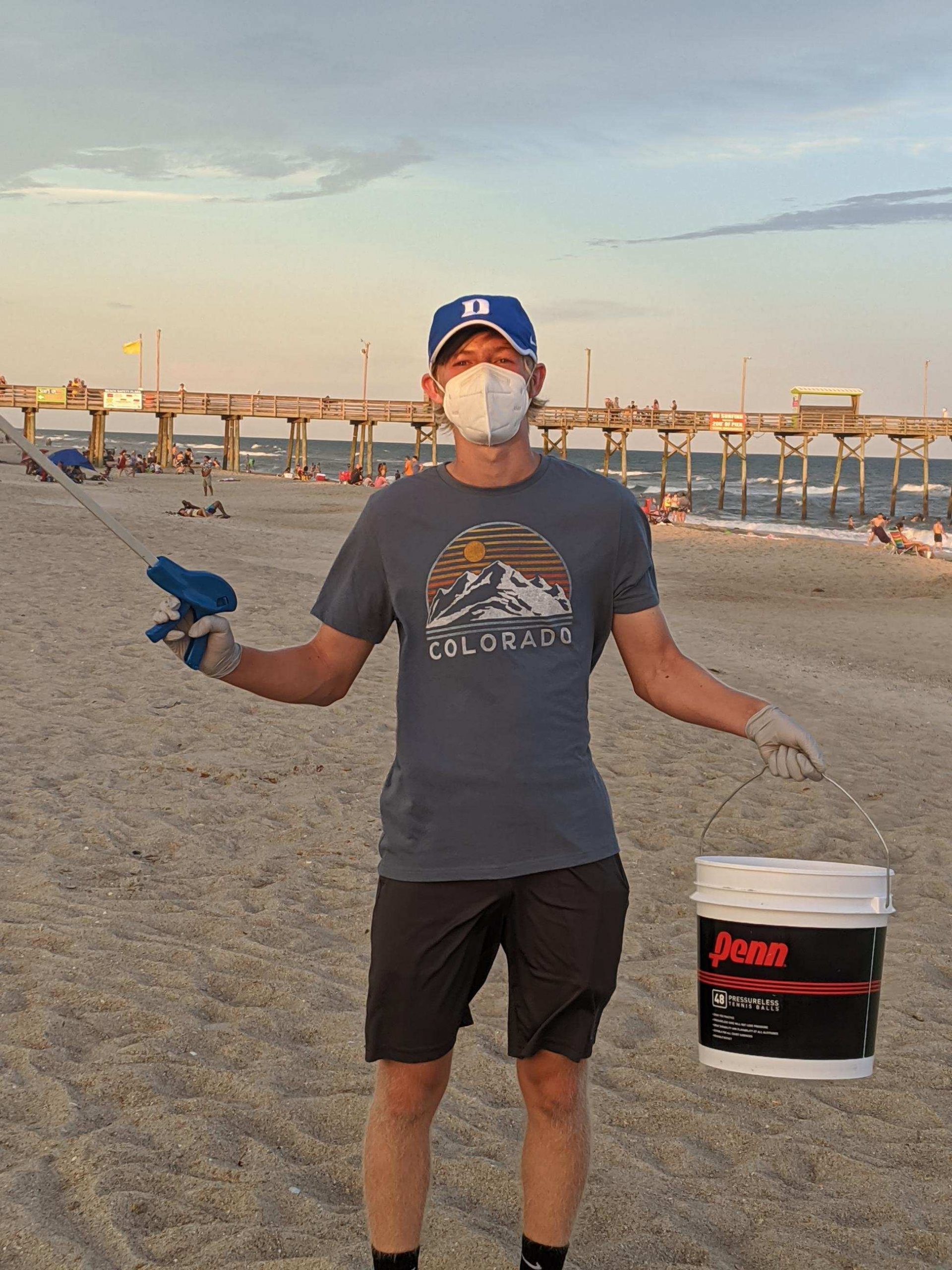
The measures put in place in March to curb the spread of COVID-19 have changed how North Carolinians consume and dispose of waste. This is the second installment in a series examining how advocacy organizations, local governments and state agencies are adapting to these changes.
Supporter Spotlight
Environmental organizations along the coast, which are having to adapt to precautions to slow the spread of COVID-19, are noticing more coronavirus-related litter, from gloves and masks to takeout packaging, which can become hazardous marine debris.
The Centers for Disease Control and Prevention, or CDC, recommends that everyone wear cloth face coverings when leaving their homes, and many use single-use personal protective equipment, like gloves, wipes and disposable masks.
Another federal agency, the National Oceanic and Atmospheric Administration, or NOAA, Marine Debris Program warns that improperly disposing of personal protective equipment can create marine debris and harm the environment.
“Improperly discarded PPE can enter the environment through ineffective or improper waste management, intentional or accidental dumping and littering, or through stormwater runoff. Even if you’re at home, hundreds of miles from the shore, our trash travels and can adversely affect the ocean and harm the wildlife that share our planet,” the blog states.
Judith Enck is president of Beyond Plastics, a nationwide project to end plastic pollution. During a recent webinar, “Plastics Policy in the Age of COVID,” she explained that the World Health Organization estimates that 89 million masks are needed every month worldwide to deal with COVID-19. The disposable masks are mostly made from plastics, polypropylene, polyurethane, polyester and other polymers.
Supporter Spotlight
“These masks and gloves are already showing up in water bodies. There have been litter surveys in Hong Kong, Nigeria and France. An organization called Oceans Asia went to a remote beach just 11 meters (36 feet) long and found 70 masks,” Enck said. “The next week they found 30 on a remote beach. So one option is to use reusables, whenever possible. That certainly may not be possible with gloves and all the masks, although, nonmedical professionals like me can use reusable masks. I’ve been using one since the beginning of the pandemic.”
In addition to her role with Beyond Plastics, which is based at Bennington College in Vermont where she teaches, Enck is a former Environmental Protection Agency regional administrator appointed by President Obama.
“And now we have a new universe of plastic waste that needs attention: masks and gloves. Let me be clear, everyone should wear a mask in public, but no one should litter the mask. And no one should put the mask or the gloves in their recycling bin because they’re not recyclable,” she said.
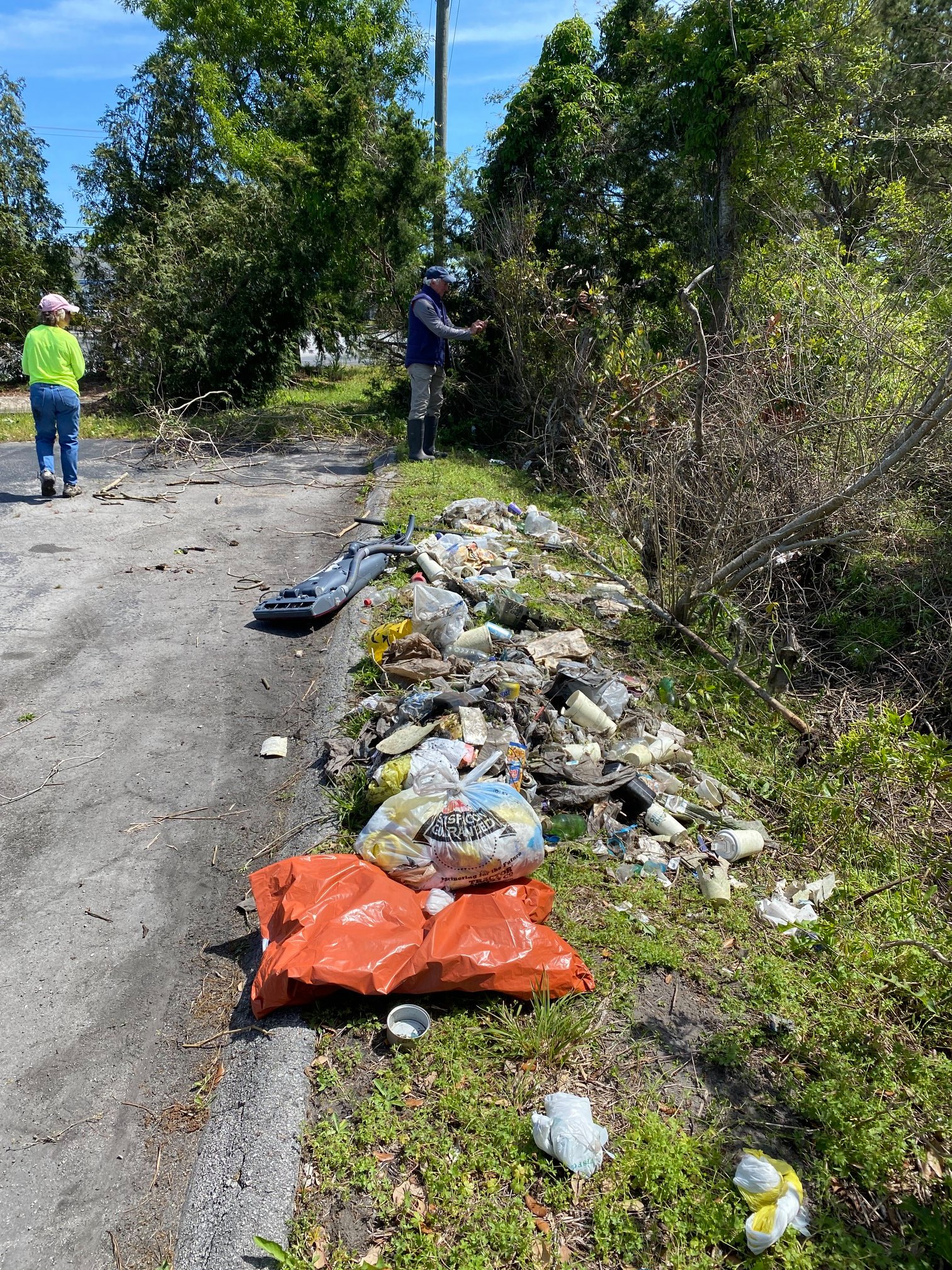
“We most certainly have seen an increase in COVID-19-related litter,” said Dee Smith, Carteret Big Sweep coordinator. “I have seen numerous masks and gloves, especially roadsides and parking lots.”
Carteret Big Sweep is the county’s effort to educate the public on litter and encourages and coordinates year-round cleanups.
Smith said another concerning item is the grocery cart wipes.
“I have seen them all over roads and parking lots as well as sidewalks and just on the floor in stores. It is like people can’t find a trash can and they just leave them in the buggy and then it gets outside and the wind transports it,” she said.
Carteret Big Sweep has really had to adapt since COVID-19, Smith said.
“We have not stopped our efforts, we just evolved. We have individuals and families cleaning most of the major beach accesses on Bogue Banks every night,” she said.
Big Sweep has had a difficult time recruiting volunteers due to the COVID- 19 pandemic. The summer solo cleanups were geared toward students needing to complete volunteer hours. The students were asked to commit a minimum of 25 volunteer hours by Labor Day Weekend. The students were assigned sections of busy beaches to clean during the solo effort that provides the needed social distancing, but allows for cleanup actions to continue.
As of mid-August, Smith said there were 137 documented solo cleanups on Bogue Banks.
“It is well over 2,000 pounds of debris. They are finding everything from food and beverage items to shoes, sunglasses and toys. Some notes left in the comments include lots of cigarette butts and the amount of plastic. People also mentioned they saw an increase in masks with an increase of people,” she said.
Solo and family efforts brought in more than 2,103 pounds of debris over the course of 130 hours cleaning.
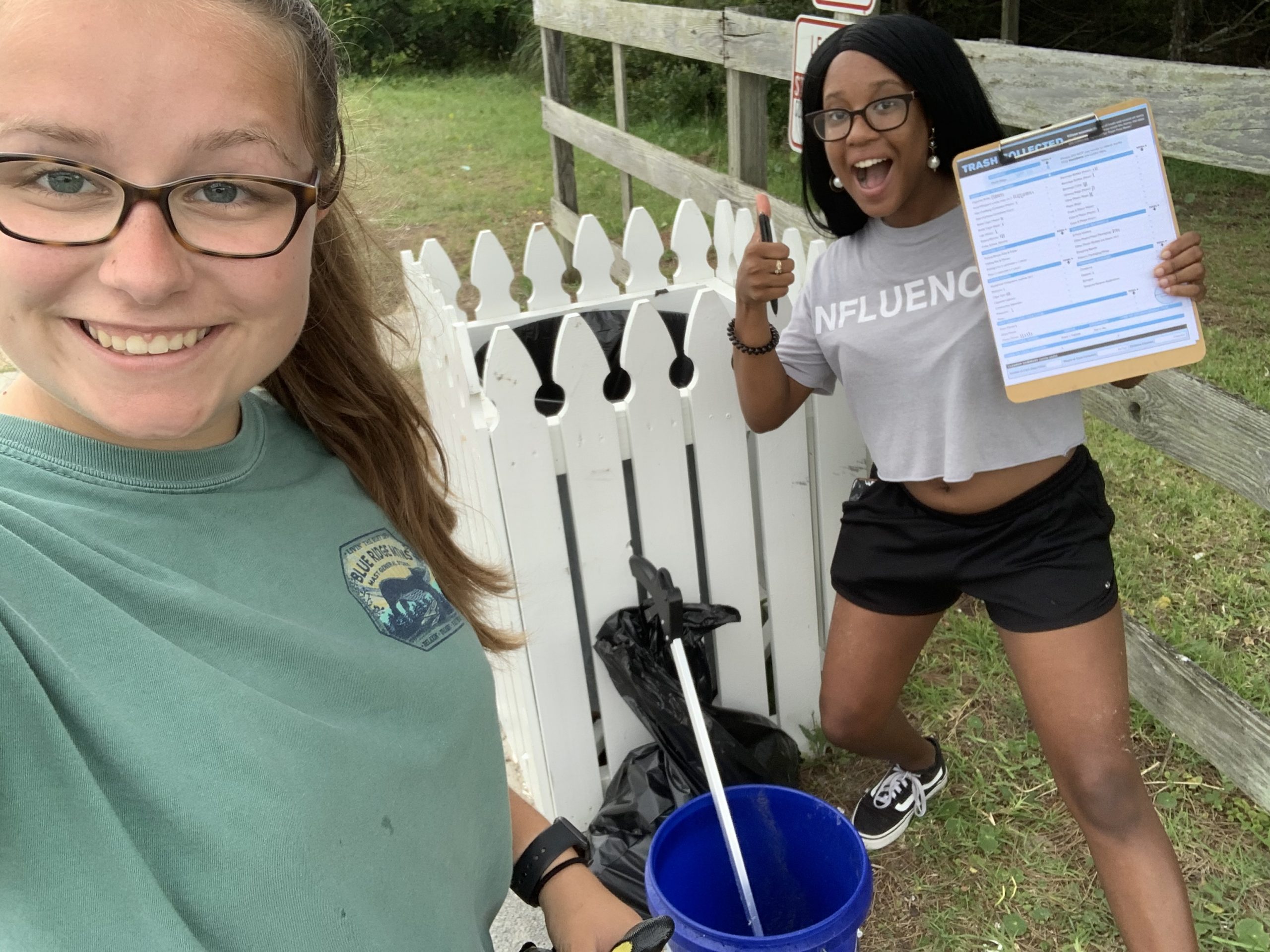
Smith said that she is recruiting small groups, families and individuals for the Ocean Conservancy’s 35th International Coastal Cleanup or ICC, Sept. 19. “We already have a few interested groups. We will follow all of the governor’s restrictions.”
The cleanup is the world’s largest volunteer effort to remove and record trash from local lakes, waterways, beaches and the ocean, according to a recent release from Big Sweep.
“Whether engaging in this year’s ICC from home, or safely throughout the County, you are playing a critical role helping to keep plastics out of our ocean and waterways,” Smith said. “Although traditional, large group cleanups are not possible this year, ocean plastic pollution isn’t going away. It’s wonderful to see people taking action where they can.”
Ocean Conservancy will release a series of online resources to help think creatively about reducing everyday waste footprint, or conduct a small, safe cleanup.
“The International Coastal Cleanup remains one of the most effective ways for individuals to make an immediate, tangible impact for our ocean,” said Allison Schutes, Ocean Conservancy’s International Coastal Cleanup director, in a statement. “The ICC will certainly look a little different this year, but the ocean still needs us. Luckily, there is still plenty we can do to help stem the tide of ocean plastic pollution. We are so grateful for the efforts of Carteret Big Sweep and all the Carteret County volunteers in helping us achieve our shared vision for a cleaner, healthier ocean.”
Carteret Big Sweep cleanup volunteers can log the trash they collect in Ocean Conservancy’s Clean Swell app on their mobile phone. Scientists, researchers, industry leaders and policymakers use the index to inform policy and determine solutions to the growing marine debris crisis.
“Every year, millions of tons of trash, including an estimated 11 million metric tons of plastic waste, flows into the ocean, impacting more than 800 marine species and entering the food chain, the release from Big sweep. “Over the last 34 years of the ICC, 16.4 million volunteers have joined cleanup efforts big and small to remove 344 million pounds (156 million kilograms) of trash from beaches and waterways worldwide.”
In 2019, Carteret Big Sweep volunteers collected and recorded 15,051 pounds of trash from Carteret County, mostly cigarette butts and plastics.
Contact Smith at dee_edwards-smith@ncsu.edu to join the effort.
Surfrider Foundation, Outer Banks Chapter, is not hosting group cleanups or in-person events but is encouraging volunteers to grab a reusable bag or container to collect litter in their neighborhood or on the beach, document the findings by taking a picture or video and tagging the organization on Instagram, @surfrider_obx, with the hashtag #solobeachcleanup.
Bonnie Monteleone, executive director for Plastic Ocean Project based in Wilmington, said recently how surprised she was to see how many masks and gloves the volunteers picked since beginning April 22 for Earth Day. Plastic Ocean Project is a nonprofit organization conducting education through research, outreach through art, and solutions through collaboration.
“Our plan for 2020 was to do monthly cleanups for Route 421, mostly because so much debris ends up on the side of the road from trucks headed to the landfill,” she said.
“We had two cleanups before COVID. Pre-COVID cleanups, we did not find gloves and masks. When we started up again June 14, we found over 20 gloves and eight masks that day and find them every time we conduct cleanups,” Monteleone said.
“I think the more people use reusable masks, the less likely they get lost in the environment. In fact, 99% of the masks we find are the disposable kind,” she explained.
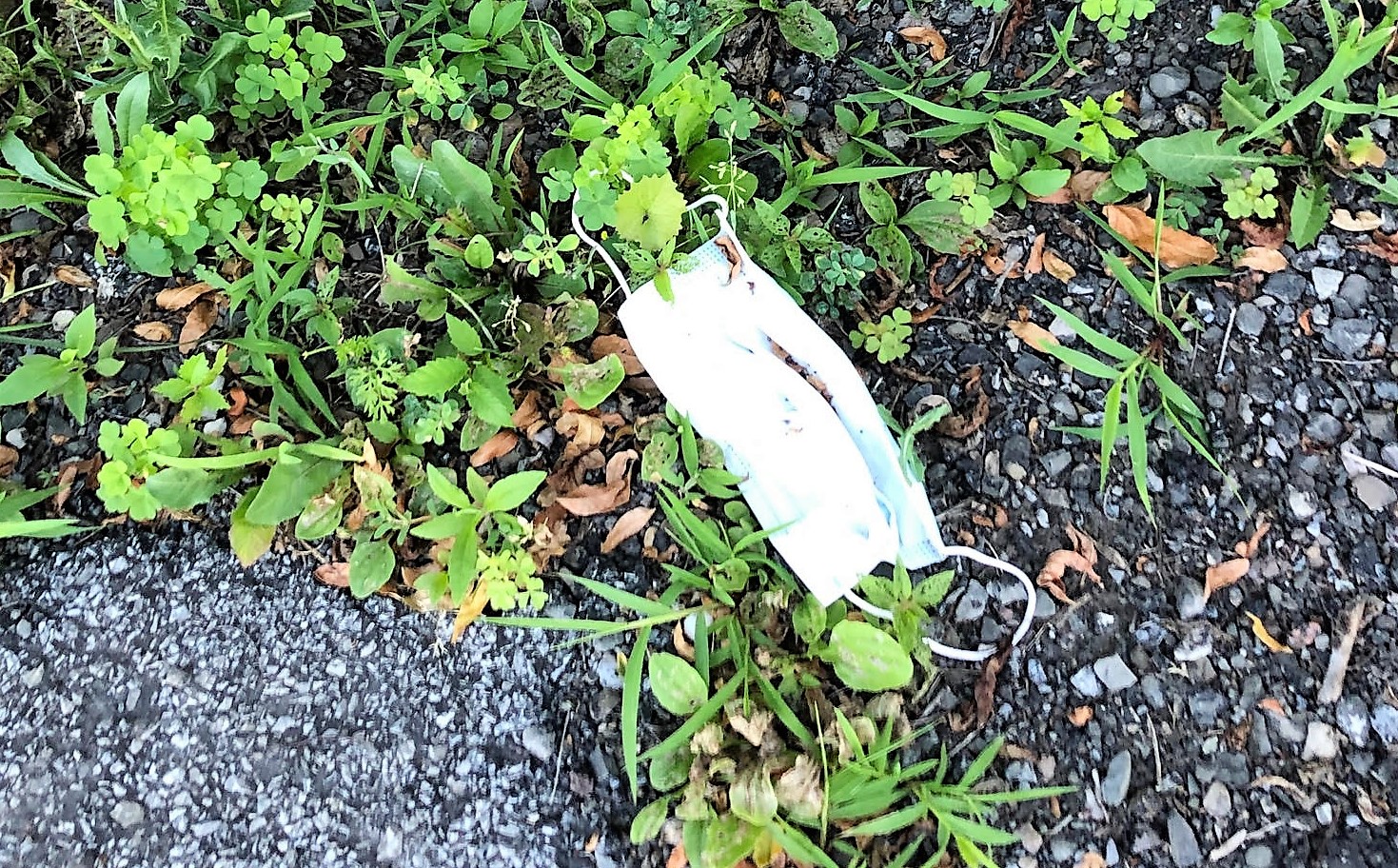
Leslie Vegas, coastal specialist with the North Carolina Coastal Federation’s northeast office in Wanchese, told Coastal Review Online that there’s been a noticeable increase in debris on the beaches and shorelines.
“Restaurants have been advised to use single-use (plastics) whenever possible, so businesses that have typically never used single-use plastics are using them now as a safety precaution. Takeout has also increased, so there have been far more plastic bags and clamshell containers in garbage bins, which we’ve also noticed have been overflowing more regularly,” Vegas explained. “Our local public waste staff noted that they are understaffed due to the virus, but have never seen so much trash here when they do their pickups. All in all, there’s a rise.”
Jan Farmer, a volunteer with the Topsail-area Ocean Friendly Establishments, said that from a trash perspective, she’s not seeing a noticeable increase in takeout containers, cups, food wrappers on the beach or along the road. “I still see and pick up plenty of those items, but not more than in previous summers.”
Ocean Friendly Establishments, which the Wilmington-based nonprofit Plastic Ocean Project launched in 2016, are businesses that voluntarily make environmentally friendly decisions, primarily reducing the use of single-use plastics by only serving straws upon request and eliminating single-use plastic bags and Styrofoam, and become certified through the program.
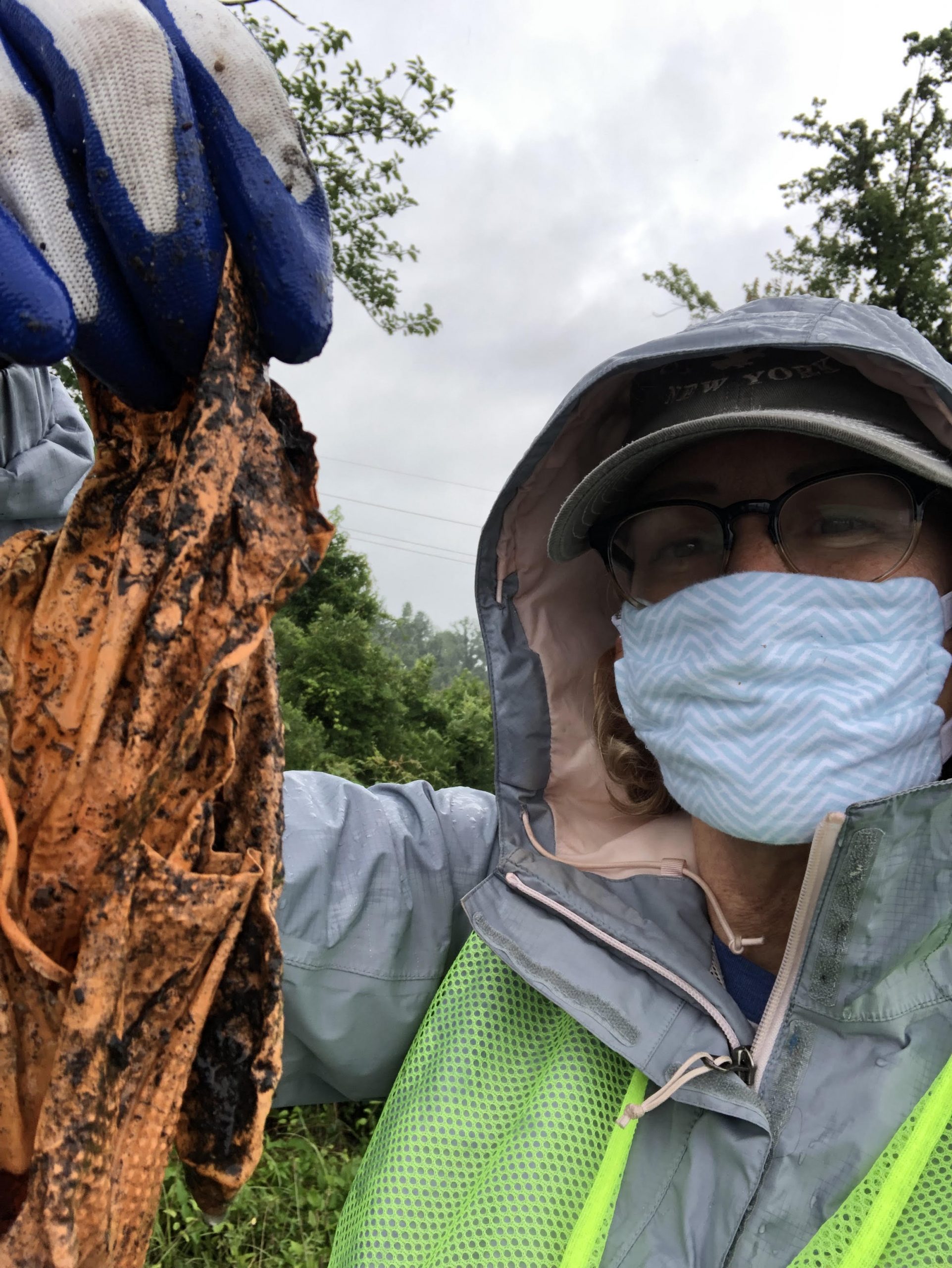
Katie Trout, marketing manager with the North Carolina Department of Transportation, said that the Roadside Environmental Unit staff, which oversees the Adopt-A-Highway program, has seen a decrease in reported pickups since the onset of COVID-19.
“Our spring 2020 sweep had to be canceled, which affected a huge amount of litter not being picked up,” Trout said.
“We have received some complaints from the public about masks and gloves being thrown down everywhere,” she added. “Adopt-A-Highway pickup reports are a bit slower than we typically see in the summer time. We should probably take into account the weather and temperature at this time, along with the COVID crisis.”
NOAA recommends another way to make a difference and reduce the impacts of all types of marine debris, including plastics, is to encourage others to properly disposing of trash and personal protective equipment and use the Marine Debris Tracker App to keep track of the debris including personal protective equipment.
The app is an initiative between the NOAA Marine Debris Program and the Southeast Atlantic Marine Debris Initiative, operated out of the University of Georgia College of Engineering, provides a way to log trash found on coastlines and waterways. The app records the debris location through GPS, and allows for adding the descriptions of items, attach photos of debris items and view the data on your phone.
Sara Hallas, coastal education coordinator for the Coastal Federation’s northeast office, said that the staff hasn’t been scheduling cleanups, as in the past, but is instead encouraging volunteers to have cleanups on their own and track their trash with the NOAA app.
“In the northeast we’ve been working safely in small groups outside to clean up some trouble areas that needed it, as well as arranging to loan cleanup supplies to groups who may like to organize efforts on their own,” she said. “For example, a Boy Scout was looking for a community service project. So I arranged a time to loan some cleanup supplies and advised him on a site that needed work, and he did the rest to coordinate with the group and lead the actual cleanup itself.”



